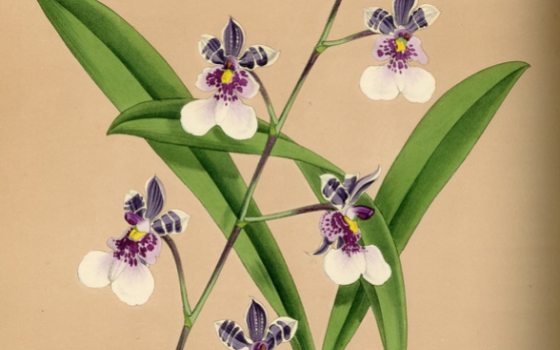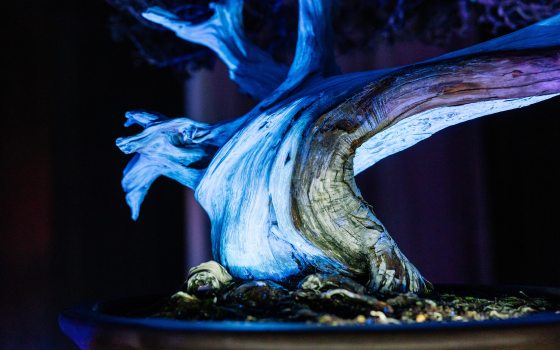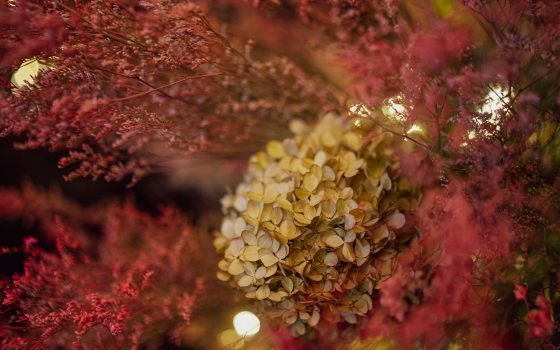When Pierre and Alice du Pont were married in October 1915, the Longwood estate already boasted beautiful outdoor flower gardens, the Open Air Theatre, and a brand new addition to the Peirce-du Pont House—a conservatory. Their passion for gardens was evident. Features that we associate with Longwood today, like dahlias, roses, topiaries, fountains, champion trees, and brilliant spring bulbs were already notable; however, there were no orchids.
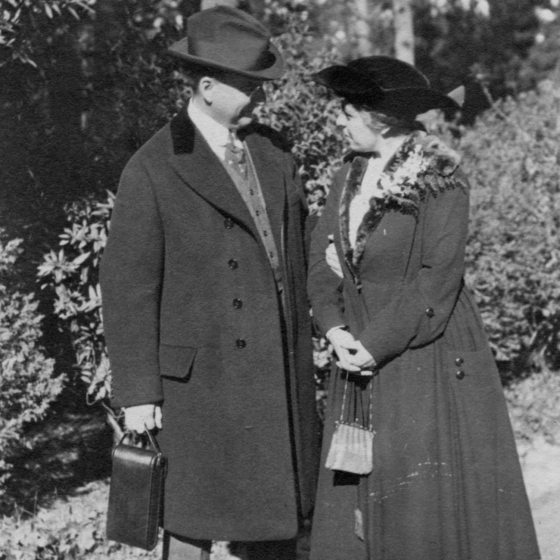
Pierre S. du Pont and Alice Belin du Pont, 1915. Image courtesy Hagley Museum and Library.
Inspired by their travels and a burgeoning collection of garden and plant literature, construction on a larger Conservatory at the west end of the property began in the spring of 1919. A large Conservatory complex would vastly expand the du Ponts’ palette of plants and serve as a venue to entertain their guests, even during the winter months. With construction underway (and still two years from completion), the du Ponts began to plan their indoor gardens. A large, heated conservatory allowed Pierre and Alice to pursue plants that had not been grown at Longwood before, and many of the plant collections most closely associated with Longwood Gardens were started during this time. They planned spaces to feature ornamentals such as roses and hibiscus, large numbers of acacias, and camellias from abroad. The couple also purchased several varieties of fruiting plants to expand the production capabilities of Longwood Farms. Though Pierre and Alice had not grown or collected orchids before, they set aside a portion of their Conservatory specifically for an orchid collection.

Steel beams begin to take the recognizable shape of the Conservatory Complex, 1919. Image courtesy Hagley Museum and Library.
By November of 1919, Pierre was in contact with nurseries about local orchid collections for purchase. The collections Pierre considered were large—sometimes enormous—but often fairly homogeneous. American orchid collectors were somewhat limited in the varieties of tropical orchids they were able to purchase due to importation restrictions on plants.
Further, tropical orchids were costly and rare, requiring specialized knowledge to successfully grow. When inquiring about purchasing orchid collections, Mr. du Pont noted that a complete collection should come with an experienced orchid grower to care for it. Eventually, the couple decided to amass their own collection, purchasing plants that interested them from nurseries in the United States and abroad. Their first recorded purchase was for one hundred Galearis spectabilis, an orchid native to the Eastern United States.
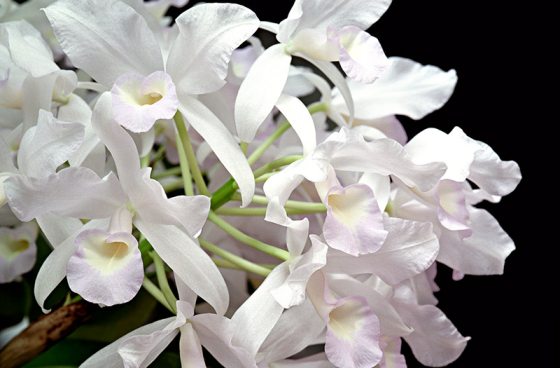
Cattleya intermedia var. alba. This white Cattleya was a popular choice for collectors in the 1920s and is one of the oldest orchids in Longwood's collection. Photo by David V. Ward.
Longtime Longwood rose grower Louis Jacoby was assigned with the care of the orchids in 1924. He had not cared for orchids in the past, but proved a quick study and meticulous experimenter. Jacoby pored over the du Ponts' library of orchid texts and kept detailed notes of his work.
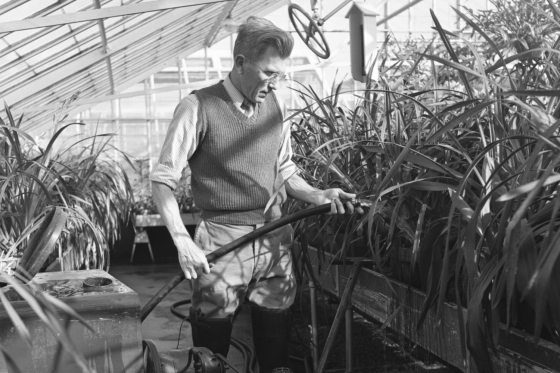
Louis Jacoby, Longwood’s first orchid grower, feeding the orchids. Circa 1950s. Photo by Gottlieb Hampfler.
The du Ponts’ collection of orchid books was impressive by this time, including classic 19th-century works like Reichenbachia (1888-1890 edition) and the ten-volume Orchid Album (1881-1893). The collection flourished under the care of Jacoby. As the du Ponts grew their orchid collection, Jacoby also expanded its scope by trading plants and information with local collectors. The most prominent acquisition of orchids came in the form of a gift from the family of Pierre’s sister-in-law, Ethel du Pont. Her estate donated her renowned collection to Longwood, expanding the collection with over two thousand rare and unique orchids.
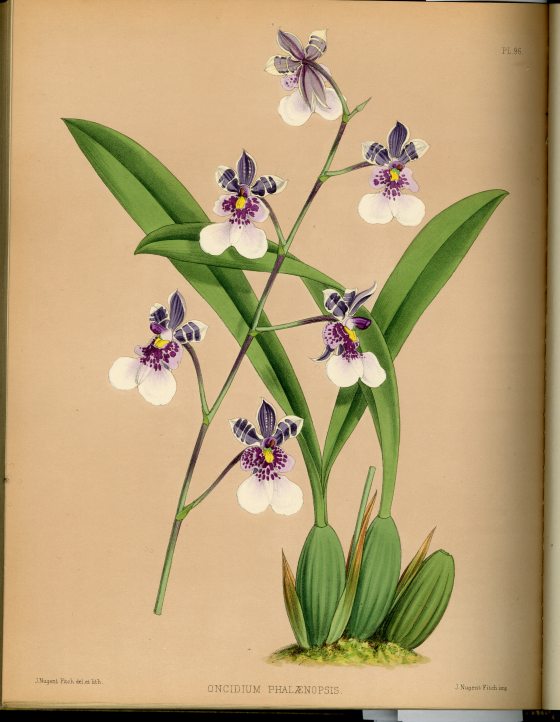
Hand-colored plate from The Orchid Album, volume 2, plate 96, Oncidium phalaenopsis. Courtesy of Longwood Gardens Library & Archives.
Today, the orchid collection at Longwood Gardens contains over 6,000 plants. The current size and beauty of this collection are products of the efforts of donors and gardeners over the course of nearly 95 years. It encompasses plants, literature, and the knowledge amassed by years of skilled gardening. The Orchid House represents the face of this collection, displaying orchids in bloom every day of the year. We also dedicate a display across the entire Conservatory every winter to highlight this diverse family of plants. Longwood's students and interns experience our Orchid Extravaganza on-the-job, learning in the spirit of Louis Jacoby. Display Design Intern Jenna Otto notes, “As the display intern I always see the designs on paper first. Now as installation approaches I am excited to see this amazing display come to life. With a record number of orchids and new display spaces there are always challenges to implementation but I am sure the results will be beautiful.”
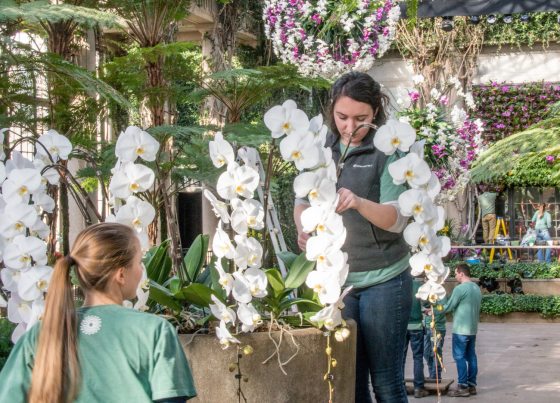
Thanks to the combined efforts of our volunteers, students, and dedicated staff, Orchid Extravaganza 2016 is now on view. Photo by William Hill.
Orchid Extravaganza brings our orchid collection to the forefront, displaying orchids both gorgeous and intriguing throughout the Conservatory. We invite you to experience our orchids at their finest during Orchid Extravaganza, on display from January 23–March 27, 2016.
